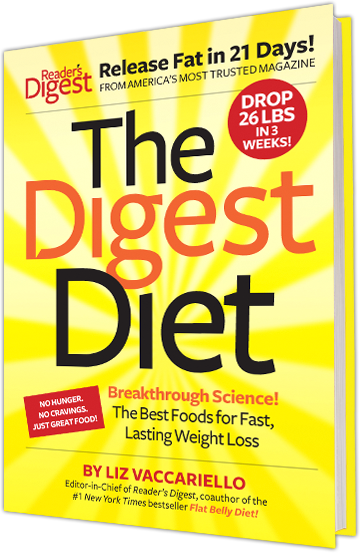I spend quite a bit of my time talking about diet and exercise. Â Eight hours a week, to be precise, and that’s just at work.
One of the courses I teach is our basic wellness/health-related fitness class. Â I’m a lab instructor, which mostly means I’m a glorified gym rat. Â But the students are required to do a lot of the learning/studying online, with a lecturer to hit the high points. Â We spend quite a bit of time talking about nutrition, obesity, diabetes, fitness (a whole semester). Â Though the majority of these students are kinesiology majors and intend to be p.e. teachers, personal trainers, physical therapists, etc., we often have some students who take the course as a general requirement and are not in good physical shape (not even decent physical shape, sometimes). Â It’s really amazing how much of a difference learning basic food and fitness knowledge can make.
Well, Reader’s Digest has recently published two books, The Digest Diet, and The Digest Diet Cookbook.  The author Liz Vaccariello (editor-in-chief of Reader’s Digest) combed through the latest and greatest research to craft The Digest Diet, basing her ideas on research, not fads.
I have actually read through the entire Digest Diet (a near miracle these days) and am rather impressed. Â While I may not agree with everything she says (based on the knowledge I have previously learned), she does have good information to back it up and I intend to read some of the scientific studies in-depth.

The Digest Diet is basically a 3-week program, broken into 3 sections. Â The first is 4 days long and designed to get your body ready to lose the pounds. Â However, before starting the diet, there are a few really good chapters about healthy and unhealthy habits, as well as foods that increase fat in your body and foods that decrease fat in your body. Â A 2009 study out of Brazil showed a decrease in waist circumference in abdominally obese women who ate coconut oil. Â Did you know that? Â I think it’s time I start adding a little of that back in to my diet.
After reading the entire book, I intend to give the Digest Diet a try, though I will wait until my break in May. Â I don’t think it would work too well for me to restrict my calories while teaching 8 hours of fitness classes a week (the initial phase is very low-calorie). Â However, I can (and should) make a few adjustments right now (like stop making cheesecake…), as most of us probably should.
Do you drink soda? Â Liz Vaccariello says it’s a no-no. Â I highly agree (except for a rare treat – I love a nice Trader Joe’s old fashioned root beer with ice cream). Â After a nutrition lesson in one of my Pilates classes last semester, one of my students decided she was going to quit drinking soda. Â She lost 10 pounds by the end of the semester.
I haven’t had a chance to make any of the recipes in the cookbook yet, but they look right up my alley (but not my husband’s). Â Stir-fried shrimp with yellow grape tomatoes, garlicky chicken stew with artichokes, Vietnamese Pho with chicken & spaghetti squash… they are made with fresh ingredients and lots of flavorful ingredients without a lot of salt. Â While not all of the recipes are inherently gluten-free, many of them are or can be easily made as such. Â There is even a chickpea & arugula “pizza” recipe that’s already gluten-free.
These books are full of good advice for living a healthy lifestyle, above and beyond the 21-day “diet.”
What is your favorite healthy living tip? Â Mine is cut out the soda and make activity a part of your everyday life.